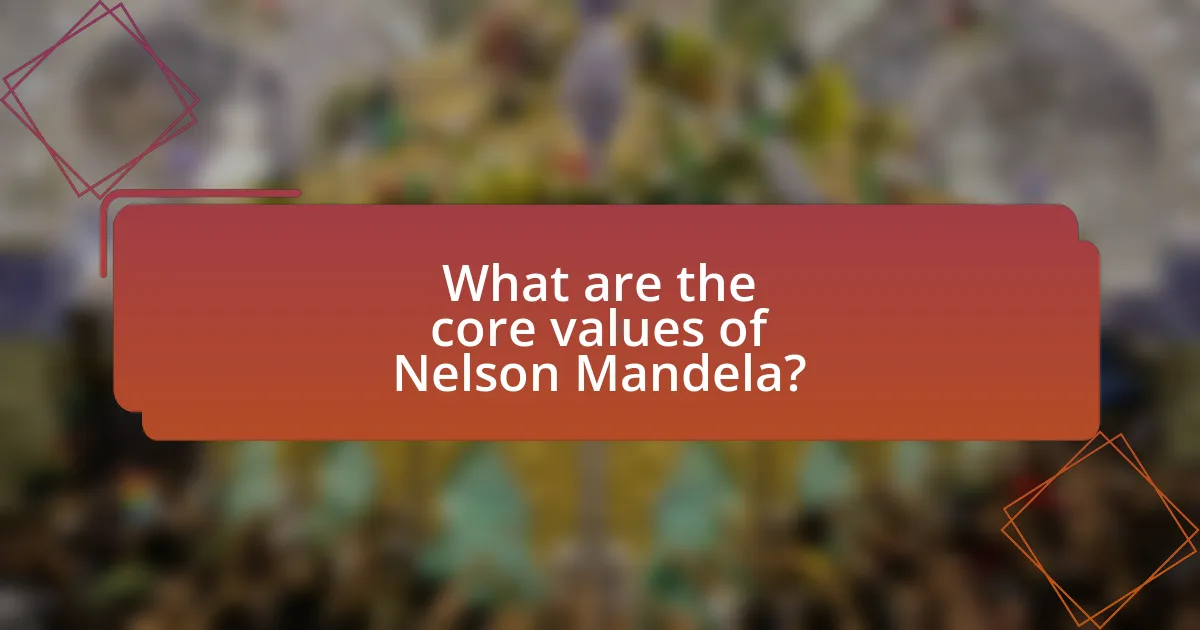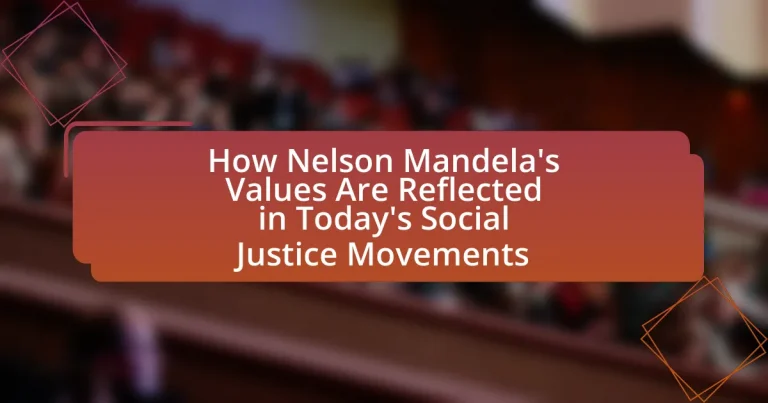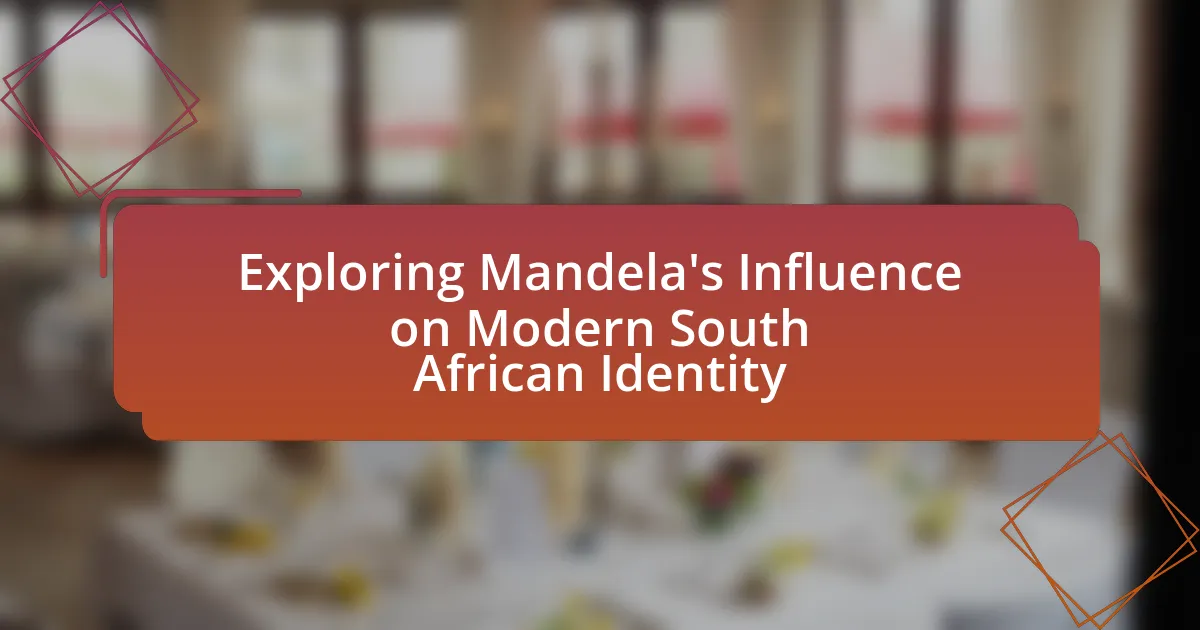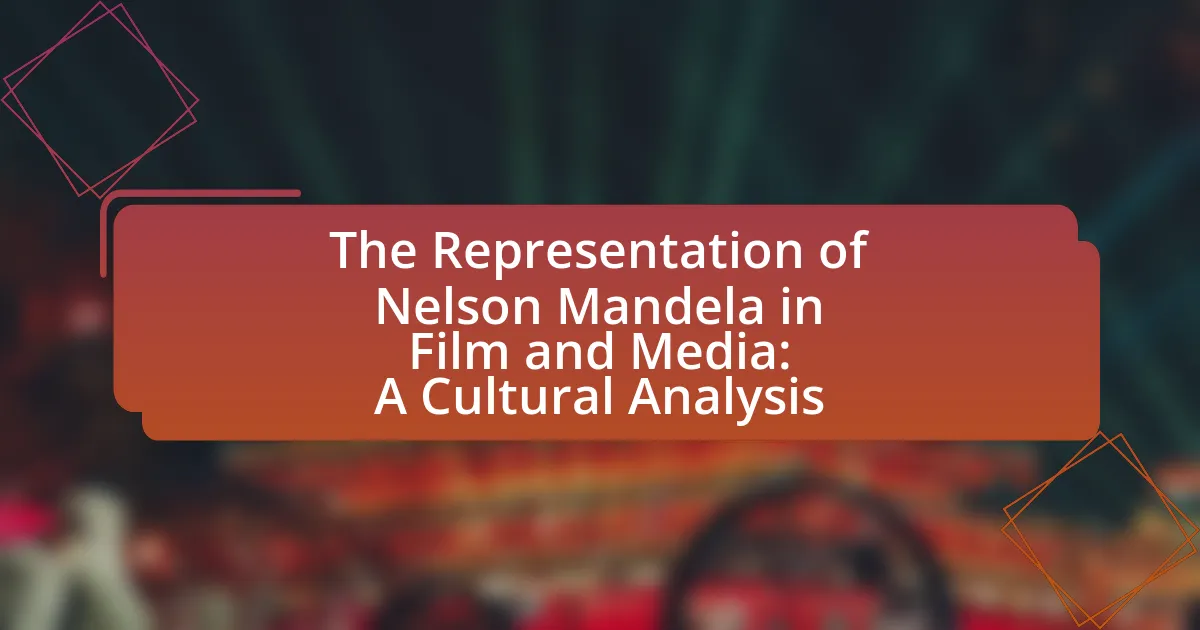The article examines how Nelson Mandela’s core values of equality, justice, forgiveness, and respect for human rights are reflected in contemporary social justice movements. It highlights Mandela’s lifelong struggle against apartheid and his emphasis on reconciliation, which continue to inspire activists today. The discussion includes the relevance of Mandela’s principles in movements such as Black Lives Matter and climate justice, as well as the challenges faced by activists in upholding these values. Additionally, the article explores how personal and collective actions can align with Mandela’s ideals to foster social change and promote inclusivity in advocacy efforts.

What are the core values of Nelson Mandela?
The core values of Nelson Mandela include equality, justice, forgiveness, and respect for human rights. Mandela’s commitment to equality is evident in his lifelong struggle against apartheid, advocating for equal rights for all South Africans regardless of race. His belief in justice is reflected in his efforts to dismantle systemic oppression and promote a fair legal system. Forgiveness is a significant aspect of Mandela’s philosophy, as he emphasized reconciliation over revenge after his release from prison, aiming to unite a divided nation. Lastly, his respect for human rights is demonstrated through his work with organizations like the African National Congress and his role in establishing a democratic South Africa, which enshrined human rights in its constitution. These values continue to inspire contemporary social justice movements worldwide.
How did Mandela’s values shape his approach to social justice?
Mandela’s values, particularly his commitment to equality, forgiveness, and human dignity, profoundly shaped his approach to social justice. His belief in the inherent worth of every individual led him to advocate for a non-racial, democratic South Africa, where all citizens could enjoy equal rights. This was evident in his efforts to dismantle apartheid, as he emphasized reconciliation over retribution, famously stating that “forgiveness liberates the soul.” His values also inspired the establishment of the Truth and Reconciliation Commission, which aimed to address past injustices while fostering national unity. Mandela’s approach has influenced contemporary social justice movements, which often prioritize inclusivity and restorative justice, reflecting his enduring legacy in the fight for equality and human rights.
What specific values did Mandela emphasize in his activism?
Nelson Mandela emphasized values such as equality, justice, forgiveness, and human rights in his activism. He believed in the fundamental principle that all individuals deserve equal treatment and opportunities, which was evident in his fight against apartheid in South Africa. Mandela’s commitment to justice was reflected in his advocacy for the rule of law and the protection of human rights, as he sought to dismantle systemic oppression. Additionally, his emphasis on forgiveness was crucial in promoting reconciliation in a divided nation, as he famously stated that “forgiveness liberates the soul.” These values continue to resonate in today’s social justice movements, inspiring efforts to combat inequality and promote human dignity globally.
How did Mandela’s personal experiences influence his values?
Nelson Mandela’s personal experiences significantly shaped his values, particularly his commitment to equality, justice, and reconciliation. Growing up in a racially segregated South Africa, Mandela witnessed firsthand the injustices of apartheid, which instilled in him a deep sense of empathy for the oppressed. His 27 years of imprisonment further solidified his belief in the importance of forgiveness and dialogue, as he recognized that true change required understanding and cooperation rather than vengeance. Mandela’s leadership in the anti-apartheid movement and his subsequent presidency emphasized these values, promoting a vision of a united South Africa where all individuals, regardless of race, could coexist peacefully. His experiences thus directly informed his advocacy for social justice, influencing contemporary movements that seek to address systemic inequalities globally.
Why are Mandela’s values relevant to contemporary social justice movements?
Mandela’s values are relevant to contemporary social justice movements because they emphasize equality, forgiveness, and the importance of collective action against oppression. His commitment to dismantling apartheid in South Africa through peaceful negotiation and reconciliation serves as a model for current movements advocating for racial justice, gender equality, and human rights. For instance, the Black Lives Matter movement draws inspiration from Mandela’s principles of fighting systemic racism and promoting social cohesion, reflecting his belief that justice is a collective responsibility. Additionally, Mandela’s emphasis on education as a tool for empowerment resonates with contemporary activists who advocate for equitable access to education as a means to achieve social change.
What parallels can be drawn between Mandela’s struggles and today’s movements?
Parallels between Mandela’s struggles and today’s movements include the fight against systemic injustice and the pursuit of equality. Mandela’s resistance against apartheid exemplified the struggle for human rights, similar to contemporary movements like Black Lives Matter, which addresses racial inequality and police brutality. Both movements emphasize grassroots activism and the importance of collective action, as seen in Mandela’s leadership in the African National Congress and the mobilization of communities today. Furthermore, Mandela’s commitment to reconciliation and dialogue resonates with current efforts to foster understanding and healing in divided societies, highlighting the ongoing relevance of his values in contemporary social justice initiatives.
How do Mandela’s values inspire current activists?
Mandela’s values inspire current activists through his principles of equality, justice, and reconciliation. These values encourage activists to advocate for social justice and human rights, emphasizing the importance of non-violence and dialogue in achieving change. For instance, Mandela’s commitment to peaceful negotiation during South Africa’s transition from apartheid serves as a model for contemporary movements, such as Black Lives Matter, which seeks to address systemic racism through peaceful protests and community engagement. His belief in the power of forgiveness and unity also motivates activists to build coalitions across diverse groups, fostering solidarity in the fight against oppression.
How are Mandela’s values reflected in today’s social justice movements?
Mandela’s values are reflected in today’s social justice movements through the principles of equality, forgiveness, and collective action. These movements, such as Black Lives Matter and climate justice initiatives, emphasize the importance of fighting systemic oppression and advocating for marginalized communities, mirroring Mandela’s lifelong commitment to dismantling apartheid and promoting human rights. For instance, the global response to racial injustice, particularly after the murder of George Floyd in 2020, showcases a collective mobilization reminiscent of Mandela’s efforts to unite diverse groups against oppression. Additionally, Mandela’s emphasis on reconciliation is evident in movements that seek to bridge divides and foster dialogue, highlighting the necessity of understanding and healing in the pursuit of justice.
What examples illustrate the influence of Mandela’s values in modern activism?
Nelson Mandela’s values significantly influence modern activism, particularly through movements advocating for racial equality, human rights, and social justice. For instance, the Black Lives Matter movement embodies Mandela’s commitment to fighting systemic racism and promoting equality, drawing parallels to his struggle against apartheid in South Africa. Additionally, the global climate justice movement reflects Mandela’s emphasis on collective action and responsibility, as activists worldwide unite to address environmental issues that disproportionately affect marginalized communities. These movements demonstrate Mandela’s enduring legacy, as they continue to inspire individuals to advocate for justice and equality, echoing his principles of resilience, forgiveness, and unity in the face of oppression.
How do organizations today embody Mandela’s principles?
Organizations today embody Mandela’s principles by promoting equality, social justice, and community engagement. For instance, many non-profits and social enterprises focus on dismantling systemic inequalities, reflecting Mandela’s commitment to fighting apartheid and advocating for human rights. The Global Citizen movement, which aims to end extreme poverty and promote sustainable development, exemplifies this by mobilizing individuals and organizations to take collective action, echoing Mandela’s belief in the power of collective responsibility. Furthermore, companies like Ben & Jerry’s actively support social justice initiatives, aligning their business practices with Mandela’s values of fairness and justice. These actions demonstrate a commitment to creating a more equitable society, directly reflecting Mandela’s enduring legacy.
What role do Mandela’s values play in grassroots movements?
Mandela’s values play a crucial role in grassroots movements by promoting principles of equality, justice, and reconciliation. These values inspire individuals and communities to mobilize for social change, emphasizing the importance of collective action and solidarity. For instance, Mandela’s commitment to non-violence and dialogue has influenced grassroots organizations worldwide, encouraging peaceful protests and negotiations as effective means to address social injustices. His legacy is evident in movements such as Black Lives Matter, which echoes his fight against systemic racism and advocates for human rights, demonstrating the enduring impact of his values on contemporary activism.
How do different social justice movements interpret Mandela’s values?
Different social justice movements interpret Mandela’s values as a call for equality, justice, and reconciliation. For instance, the Black Lives Matter movement emphasizes Mandela’s commitment to fighting systemic racism and advocating for the rights of marginalized communities, reflecting his belief in the importance of dignity and respect for all individuals. Similarly, LGBTQ+ rights organizations draw on Mandela’s principles of inclusivity and human rights, highlighting his stance against discrimination in all forms. Furthermore, environmental justice movements align with Mandela’s values by advocating for the rights of vulnerable populations affected by climate change, echoing his understanding of interconnectedness and social responsibility. These interpretations are rooted in Mandela’s legacy, which underscores the necessity of collective action and solidarity in the pursuit of justice.
What variations exist in the application of Mandela’s values across movements?
Variations in the application of Mandela’s values across movements include differing emphases on reconciliation, non-violence, and inclusivity. For instance, the South African anti-apartheid movement primarily focused on reconciliation and negotiation, exemplified by Mandela’s leadership in the transition to a democratic society. In contrast, movements like Black Lives Matter prioritize direct action and systemic change, reflecting a more confrontational approach to addressing racial injustice. Additionally, environmental justice movements may incorporate Mandela’s values of equality and human rights but adapt them to focus on ecological sustainability and climate justice, demonstrating a shift in context while maintaining core principles. These variations illustrate how Mandela’s values are interpreted and applied differently based on specific social, political, and cultural contexts.
How do cultural contexts shape the interpretation of Mandela’s values?
Cultural contexts significantly shape the interpretation of Nelson Mandela’s values by influencing how his principles of equality, justice, and reconciliation are understood and applied in various societies. For instance, in South Africa, Mandela’s emphasis on forgiveness and unity resonates deeply due to the country’s history of apartheid, where his values are seen as essential for national healing. Conversely, in Western contexts, Mandela’s advocacy for social justice may be interpreted through a lens of individual rights and activism, often emphasizing systemic change rather than collective reconciliation. This divergence illustrates how local histories, social dynamics, and cultural narratives can alter the perception of Mandela’s ideals, making them relevant to specific struggles for justice and equality in diverse environments.
What challenges do social justice movements face in upholding Mandela’s values?
Social justice movements face significant challenges in upholding Nelson Mandela’s values, primarily due to systemic inequality and political resistance. These movements often struggle against entrenched power structures that perpetuate discrimination and injustice, making it difficult to achieve the inclusive society Mandela envisioned. For instance, in many countries, laws and policies that favor certain groups hinder efforts to promote equality and human rights, reflecting the ongoing legacy of apartheid-like conditions. Additionally, social justice activists frequently encounter backlash from authorities and societal factions that oppose change, which can lead to repression and violence against peaceful protests. These challenges highlight the complexities of translating Mandela’s ideals into actionable change in a world still grappling with deep-seated inequities.
How do systemic issues hinder the application of Mandela’s values?
Systemic issues hinder the application of Mandela’s values by perpetuating inequality and injustice, which contradict the principles of freedom, equality, and human dignity that he championed. For instance, entrenched poverty, racial discrimination, and unequal access to education and healthcare create barriers that prevent marginalized communities from fully realizing their rights and opportunities. According to the World Bank, over 700 million people live in extreme poverty, illustrating how systemic economic disparities obstruct the realization of Mandela’s vision for a just society. Additionally, institutional racism and discriminatory laws continue to exist in various countries, undermining efforts to promote social cohesion and equality, which are central to Mandela’s legacy.
What obstacles do activists encounter when promoting Mandela’s ideals?
Activists encounter significant obstacles when promoting Mandela’s ideals, primarily due to systemic inequality and resistance from established power structures. These challenges manifest in various forms, including governmental pushback against social movements, societal apathy towards issues of justice, and the co-opting of Mandela’s legacy by entities that do not align with his principles. For instance, in many countries, activists face legal restrictions that limit their ability to organize and protest, which directly undermines their efforts to advocate for equality and human rights. Additionally, the commercialization of Mandela’s image can dilute the authenticity of his message, leading to a disconnect between his ideals and the actions of those who claim to uphold them.
How can movements overcome these challenges to stay true to Mandela’s legacy?
Movements can overcome challenges to stay true to Mandela’s legacy by prioritizing inclusivity, non-violence, and dialogue. These principles reflect Mandela’s commitment to equality and reconciliation, as demonstrated during his efforts to dismantle apartheid in South Africa, where he advocated for peaceful negotiations rather than violent uprisings. By fostering a culture of collaboration and understanding among diverse groups, movements can effectively address social injustices while honoring Mandela’s vision of unity. Historical evidence shows that Mandela’s approach led to a peaceful transition to democracy, emphasizing that constructive engagement is essential for lasting change.
What strategies can activists use to effectively embody Mandela’s values?
Activists can effectively embody Mandela’s values by promoting reconciliation, advocating for equality, and practicing nonviolent resistance. Reconciliation, a core principle of Mandela’s approach, encourages dialogue and understanding among diverse groups, fostering unity in social justice movements. Advocating for equality aligns with Mandela’s lifelong fight against apartheid, emphasizing the importance of equal rights for all individuals regardless of race, gender, or socioeconomic status. Nonviolent resistance, exemplified by Mandela’s own methods during his activism, serves as a powerful strategy to challenge injustice while maintaining moral high ground. These strategies reflect Mandela’s legacy and are essential for contemporary activists aiming to create lasting change.
How can collaboration enhance the impact of Mandela’s values in activism?
Collaboration can significantly enhance the impact of Mandela’s values in activism by uniting diverse groups towards common goals, thereby amplifying their collective voice and influence. When individuals and organizations work together, they can share resources, knowledge, and strategies, which leads to more effective advocacy and mobilization efforts. For instance, Mandela emphasized the importance of collective action in his fight against apartheid, demonstrating that solidarity among various communities can lead to substantial social change. Historical examples, such as the collaboration between different anti-apartheid organizations, illustrate how unified efforts can challenge oppressive systems and promote justice. This synergy not only strengthens the movement but also embodies Mandela’s belief in the power of community and cooperation in achieving lasting impact.
What role does education play in promoting Mandela’s values among activists?
Education plays a crucial role in promoting Mandela’s values among activists by fostering critical thinking, empathy, and social responsibility. Through educational programs that emphasize human rights, equality, and justice, activists are equipped with the knowledge and skills necessary to advocate for social change. For instance, Mandela’s emphasis on education as a powerful tool for liberation is evident in his quote, “Education is the most powerful weapon which you can use to change the world.” This principle is reflected in various educational initiatives that aim to instill Mandela’s values in future leaders, such as the Nelson Mandela Foundation’s educational outreach programs, which focus on teaching the importance of democracy and human rights. These programs not only educate activists about Mandela’s legacy but also inspire them to embody his principles in their work for social justice.
How can individuals contribute to social justice movements inspired by Mandela’s values?
Individuals can contribute to social justice movements inspired by Mandela’s values by actively engaging in advocacy, education, and community organizing. Advocacy involves raising awareness about social injustices and mobilizing support for policy changes, reflecting Mandela’s commitment to fighting inequality. Education plays a crucial role, as individuals can share knowledge about human rights and social justice issues, echoing Mandela’s belief in the power of education to transform society. Community organizing empowers individuals to unite for collective action, fostering solidarity and resilience, which were central to Mandela’s approach in the anti-apartheid struggle. These contributions align with Mandela’s legacy of promoting equality, justice, and human dignity.
What actions can individuals take to support these movements?
Individuals can support social justice movements by actively participating in advocacy efforts, such as attending protests, signing petitions, and engaging in community organizing. These actions demonstrate solidarity and amplify the voices of marginalized groups, reflecting Nelson Mandela’s commitment to equality and justice. Historical evidence shows that grassroots movements, like the Civil Rights Movement in the United States, gained momentum through individual participation, leading to significant legislative changes. By contributing time, resources, or skills, individuals can help sustain the momentum of these movements, ensuring that the values Mandela championed continue to influence contemporary social justice efforts.
How can personal values align with Mandela’s to foster social change?
Personal values can align with Mandela’s values of equality, justice, and compassion to foster social change by motivating individuals to advocate for human rights and challenge systemic injustices. For instance, Mandela’s commitment to non-violence and reconciliation encourages individuals to engage in peaceful activism, as seen in movements like Black Lives Matter, which emphasizes equality and justice. Furthermore, Mandela’s belief in the power of education inspires individuals to promote awareness and understanding of social issues, leading to informed activism. Historical evidence shows that Mandela’s values have influenced global movements, such as the anti-apartheid struggle, demonstrating that aligning personal values with his principles can effectively drive social change.




